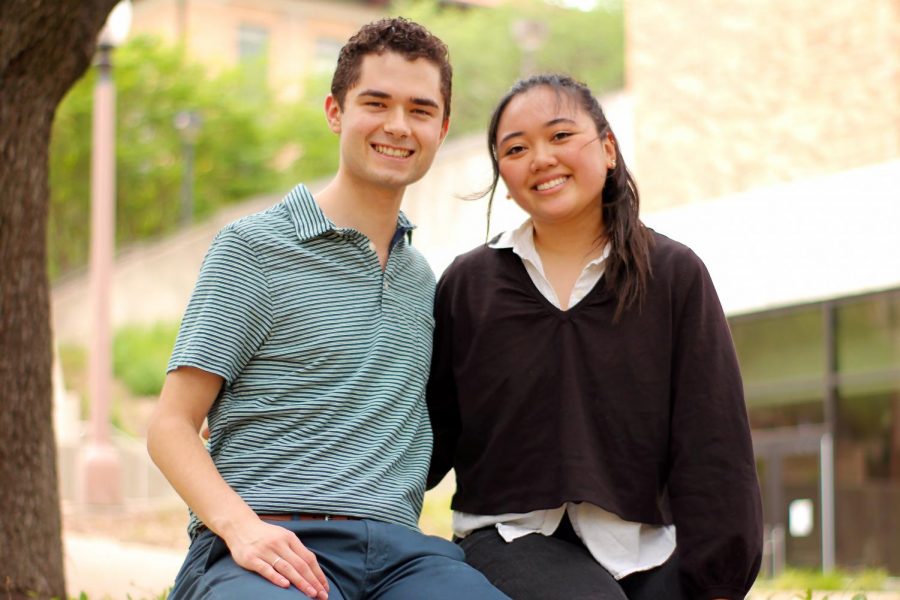UT Senate president, vice president discuss progress during the pandemic
April 29, 2021
The Senate of College Councils, one of the three legislative student organizations at UT, advocates for equal opportunities in the classroom and improvements to the quality of academics. Over the 2020-21 academic year, Senate advocated for COVID-19 pass/fail and helped connect student organizers with University administration.
The Daily Texan spoke to Senate President Alcess Nonot and Vice President Isaac James about their progress over the 2020-2021 school year.
“I learned a lot of important lessons about how priorities have to shift to better serve the interests of the students that we’re representing in events like a crisis, like the COVID-19 pandemic,” James said.
COVID-19 Pass/Fail
In partnership with Student Government, Senate held a Universitywide survey on student well-being. After analyzing the results, the legislative student organizations passed a joint resolution and presented arguments to the Faculty Council, which voted for students to have unlimited pass/fail classes. UT President Jay Hartzell later announced students are allowed to pass/fail three total classes from the fall and spring semesters.
At an April 8 general assembly, Senate passed a resolution that called to increase the limit of COVID-19 pass/fail exceptions from three to six due to Winter Storm Uri. The resolution passed through the Student Government assembly but has not been introduced in the Graduate Student Assembly. The student petition received over 3,000 signatures before it closed.
8 Demands for Transformative Change
Senate, along with other student organizations, created “8 Demands for Transformative Change” to address systemic racism at UT.
“The eight demands (weren’t) something that came out of just Senate,” Nonot said. “I think the reason why it was so impactful is because it involved a lot of people who have already been organizing on campus.”
The University has addressed some of the demands, including renaming the Robert Lee Moore Hall to the Physics, Math and Astronomy Building. This change had been in the works since 2019.
One of the eight demands included removing “The Eyes of Texas” as the alma mater, a demand that students have continued to advocate for over the past year. In July 2020, UT President Jay Hartzell said the University acknowledges the origins of “The Eyes of Texas,” but will keep the song. In March 2021, the University released a report by The Eyes of Texas History Committee, which said the song was written in a “racist setting,” but is not “overtly racist.” The Longhorn Band will be required to play “The Eyes of Texas” starting in the fall of 2022, according to previous reporting by The Daily Texan.
Since releasing the demands, Senate has also passed legislation for individual demands, which include changing the requirement for classes to fulfill the Cultural Diversity Flag requirement and continuing to use a test-optional admission policy.
Gender Inclusivity
In fall 2020, the legislative student organizations passed a joint resolution supporting the addition of an “X” gender marker in UT databases. In spring 2020, the organizations passed another joint resolution that supported adding an optional pronoun field in the UT directory. Senate implemented a fall 2019 resolution this semester by creating a map of gender-inclusive bathrooms on campus.
Collaboration with non-legislative organizations
This year, James and Nonot said they provided a space for student organizers to speak directly with University administration through the President’s Student Advisory Committee, which is a group of students that consults with the president regarding important student issues.
James said Senate worked with multiple student organizers this year to help with their agendas, including the Interpersonal Violence Prevention Coalition, those involved in the Return the Remains campaign, international students when they were facing uncertainty with enrollment last summer and undocumented students.
“We don’t know everything, and so we would rather be deferring policy issues to students who have been working on them for so long,” Nonot said. “To pretend we can sit here and know everything there is to know … is just not right, and something that LSOs shouldn’t be doing.”
Editor’s Note: This article first appeared in the April 27 issue of The Daily Texan.












